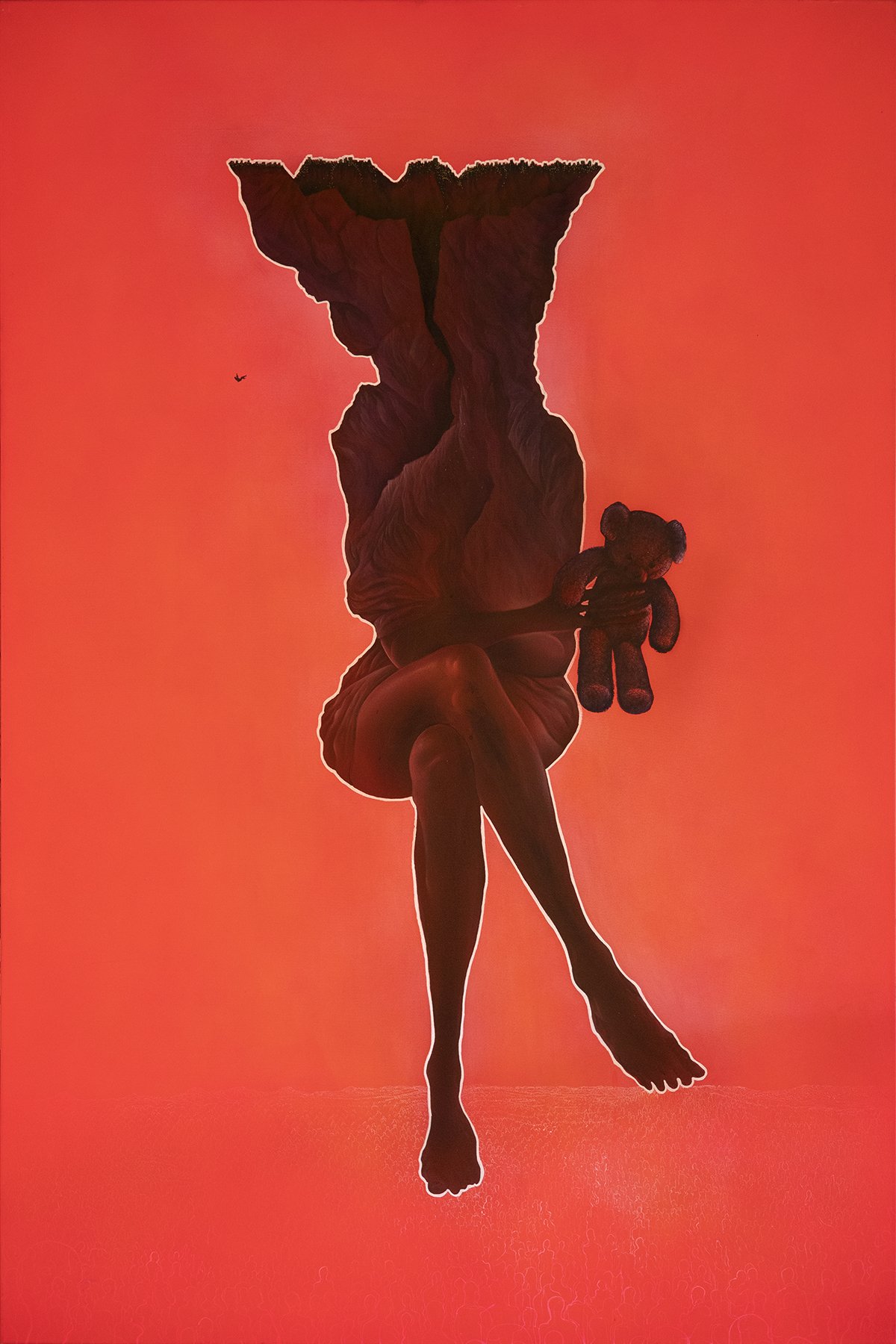Idle Idol
"Idle Icon” by Lucian Sebastian Radu
mixed media
100 x 150 cm
In our increasingly digitized world, the influence of social media on society is undeniable. Lucian Sebastian Radu's series of paintings, collectively titled "ABSENT," delves deep into the contemporary discourse surrounding the impact of social media on our lives. Among these thought-provoking artworks, "Idle Idol" stands out as a powerful visual commentary on the disconnecting effect that social media can have on individuals, the pursuit of a perceived status, and the consequences of living in an interconnected yet isolated society. This essay aims to explore the symbolism and themes in Radu's painting, offering insights into the broader implications of our digital age.
I. The Disconnecting Effect of Social Media
"Idle Idol" invites viewers to contemplate the profound disconnect that social media can create between people and their real selves. The central figure, depicted as a woman with a bag over her head, encapsulates the idea of anonymity and the loss of identity that can occur in the virtual world. This representation underscores how individuals often hide behind a digital façade, creating a persona that may differ significantly from their true selves.
The use of a bag as a metaphor for concealment is particularly poignant, highlighting the way people mask their vulnerabilities and insecurities online. The bag's transformation into a city further reinforces the idea that social media can lead individuals to lose touch with their own identity as they immerse themselves in the constructed narratives of their digital lives.
II. The Pursuit of Fake Status
The painting also addresses the notion of pursuing a "fake" status online. The woman in "Idle Idol" holds a piece of glass as a phone, symbolizing the device through which many individuals seek validation, recognition, and social status. The glass, a symbol of fragility and transparency, contrasts sharply with the artificiality and superficiality often associated with social media platforms.
The woman's elevation on an invisible chair signifies her desire to rise above social norms, to attain a status that may be illusory. This depiction underscores the relentless pursuit of perfection and popularity that social media fosters, often leading individuals to present curated, idealized versions of themselves to an audience of faceless strangers.
III. Escapism and the Crowded Megacity
One of the most striking elements in the painting is the distant figure of a man jumping out of a building, symbolizing the desire to escape the crowded and overwhelming lifestyle of a megacity. In our digital age, social media can intensify feelings of isolation and disconnection, even in the midst of a bustling metropolis. The man's leap represents a desperate attempt to break free from the digital cacophony and regain a sense of genuine human connection.
IV. The God-Like Figure and the Faceless Crowd
At the forefront of the composition, the central character is depicted as levitating above a faceless crowd of millions. This portrayal of the woman as a god-like figure speaks to the illusion of power and control that social media can bestow upon its users. It highlights how individuals, through their online personas, can amass followers and wield influence, often in stark contrast to their real-world circumstances.
Yet, this power comes at a cost—the isolation and alienation from the faceless crowd below. The faceless crowd serves as a representation of the masses who, while digitally connected, remain largely disconnected from each other on a personal and emotional level.
Conclusion
Lucian Sebastian Radu's "Idle Idol" is a profound work of art that encapsulates the multifaceted impact of social media on contemporary society. It serves as a thought-provoking reflection on the disconnecting effect of social media, the pursuit of a fake status, the desire for escapism from the digital megacity, and the illusion of power in a world of faceless crowds.
Through this painting, Radu invites us to critically examine our relationship with technology and the digital world. "Idle Idol" compels us to question the trade-offs we make in our quest for digital validation and recognition and to consider the consequences of our increasingly mediated lives. Ultimately, it prompts us to reevaluate the balance between our virtual and real selves in an era where the line between the two is becoming increasingly blurred.






